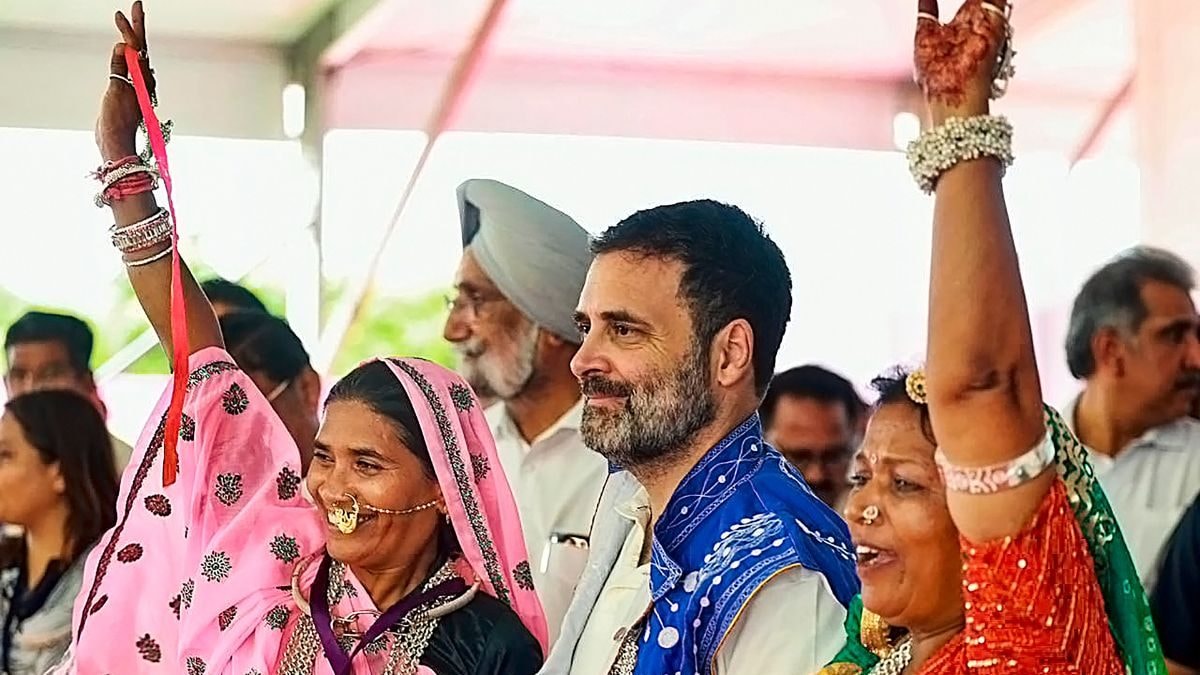A peculiar poll battle is on the cards in Rajasthan’s tribal-dominated Banswara-Dungarpur constituency, which will go to polls in the second phase of the Lok Sabha elections on April 26. The Congress is appealing to the people not to vote for its candidate. The reason: After much flip-flop, the Congress decided to support Bharat Adivasi Party candidate Rajkumar Roat, a day before the last date of withdrawal of nominations, despite fielding its own candidate Arvind Damor.
While Damor was supposed to withdraw his nomination, he was nowhere to be seen till the last date of withdrawal of nominations was over. Later, appearing before the media, he feigned ignorance about the developments and declared that he will contest the election.
What was supposed to be a bipolar contest between the BJP and Congress-BAP alliance has now turned into a three-way fight with Damor likely to divide the Congress votes, thus, giving an edge to the saffron party.
The Bharat Adivasi Party (BAP), which was established in southern Rajasthan ahead of the 2023 assembly elections, has three MLAs, including Roat.
Banswara-Dungarpur, which is a reserved seat for Scheduled Tribes, is in the news after Prime Minister Narendra Modi addressed a rally on April 21 where he made the controversial “wealth redistribution” remark. Slamming the Congress manifesto, he had alleged that the opposition party was planning to give people’s hard-earned money to “infiltrators” and “those who have more children” and referred to former PM Manmohan Singh’s speech in 2006 to contend he had said that Muslims have the “first claim” on the country’s resources.
Banswara is among the 25 parliamentary constituencies in Rajasthan. It encompasses the entire Banswara district and a portion of Dungarpur district. It has eight assembly segments — Dungarpur (ST), Sagwara (ST), Chorasi (ST), Ghatol (ST), Garhi (ST), Banswara (ST), Bagidora (ST) and Kushalgarh (ST).
It is presently represented by Kanakmal Katara of the BJP. Contesting candidates include Mahendrajeet Singh Malviya (BJP), Congress-BAP candidate Rajkumar Roat and another Congress candidate Arvind Damor.
What are the political dynamics?
With an interesting turn of events, Banswara may end up witnessing a three-way contest. While the BJP has fielded former Congress MLA Mahendrajeet Singh Malviya, the Congress campaign remains mired in chaos and confusion. The party is torn between alliance partner BAP and its former pick, Arvind Damor, who went rogue when asked to withdraw his nomination.
In the 2023 assembly elections, the Congress bagged five seats, the BJP two and the BAP one in Banswara. A bypoll for the Bagidora assembly seat will also be conducted on April 26. The seat shares borders with Gujarat and Madhya Pradesh and is an epicentre of tribal politics in the region with over 75 per cent of the population from the scheduled tribes.
BJP
The Banswara constituency was a Congress bastion until it was breached by the BJP’s Dhan Singh Rawat in 2004. The seat swung back to the Congress in 2009, but in 2014, it was swept away by the Modi wave and the BJP went on to serve two consecutive times.
In 2019, Kanakmal Katara of the BJP won the election with a massive lead of over 3 lakh votes. He is seen as a well-known leader. However, in 2023, Katara lost in the assembly election, which led to his demotion. Katara was denied a ticket in 2024, and while he welcomed the decision to field Mahendrajeet Singh Malviya, the party faced some opposition from local leaders.
The BJP has picked Malviya, who won the Bagidora seat on a Congress ticket in 2023 and later defected. Malviya is a four-time MLA and was also elected as an MP from Banswara in 1998. From Bagidora, the BJP has fielded a close aide of Malviya, Subhash Tamboliya, who also switched over from the Congress party. So far, the BJP’s leaders, despite initial differences, stand united in their campaign.
Malviya is a highly influential and veteran tribal leader with considerable sway in Banswara, which is dominated by the tribal community. His rallies comprise highly enthusiastic crowds, and he is known for often singing a century-old revolutionary folk song, “Nai Maanu re Bhuratiya,” reminiscent of the tribal freedom struggle against the British.
Observers say that the BJP has picked the best possible candidate here and also indicate that the party is keen on propping up a popular tribal leader who can wield influence in the tribal politics of not just Rajasthan but also Gujarat and Madhya Pradesh. PM Modi finds considerable influence in Banswara. His visit on the 21st of April is being anticipated with tremendous enthusiasm by party workers and the public.
Political winds favouring the BJP blow into Banswara from Gujarat and Madhya Pradesh. In November 2023, PM Modi remembered the death anniversary of Govind Guru, a prominent tribal leader during the Indian freedom struggle, and had suggested that Mangarh Dham, a monument of tremendous significance to the tribal community, should be declared a national monument. This time around, the public is hoping for a final announcement of the same. If the BJP does so, it will significantly boost its fortunes on polling day.
The BJP’s welfare schemes are considerably visible in their effect here which plays into the Modi factor. Moreover, the state switching to a BJP government leaves the BJP in a position of strength. Finally, the issue of conversion of Bhil community members to Christianity has raised concerns among the Hindu population, which the BJP is expected to encash on.
The RSS also has a presence here, working for the emancipation of tribal communities and combatting the surge in conversion rates. Apart from support from Sagwara, Garhi and Bagidora where voters will lean strongly towards the BJP, Malviya’s popularity is an asset on its own, and the defection of prominent local Congress leaders further helps the BJP’s cause. Chaos in the opposition camp also serves as a gift to the BJP.
Congress
The Congress finds itself in a considerably vulnerable position in Banswara. Despite being a solid contender, the party’s self-inflicted jolt in recent weeks has left it in a state of confusion. After dilly-dallying for weeks, the party declared a last-minute tie-up with the BAP, an emerging player in the landscape of tribal politics, but not until it had already nominated its own candidate, Arvind Damor, from the seat. An ‘out of contact’ Damor reportedly went rogue when he was expected to withdraw his nomination with just hours left to spare before the withdrawal deadline set by the Election Commission. The end result is that the Congress is standing against its own symbol in Banswara. While the party has extended its support to Rajkumar Roat of the BAP, its own symbol will also show up on the EVMs, giving way to a three-way contest that threatens to divide the opposition’s votes.
The Congress candidate for the Bagidora Assembly by poll, Kapur Singh, also did not withdraw his nomination on the party’s command. Damor wondered before the media why he was ‘fooled’ and how his career of 17 years has been put at stake. He went on to declare that the arrow has left the bow, and he will continue to be in the fray with “full strength”.
With just a few days left before polling day, the Congress’ four MLAs are also reportedly not involved in campaign efforts. BAP’s Formidable Face: Regardless of the Congress’ embarrassing error, the BAP’s Rajkumar Roat, a two-time MLA from the Chorasi constituency. Roat is known for his staggering victory in 2023, where he pulled off a winning margin of 69,166 votes.
Roat, 31, is a charismatic leader with tremendous sway among the youth. Surrounded by thousands of supporters, he arrived on a camel to file his nomination from Banswara. Roat finalised the alliance with the Congress and declared that he was aligned with Rahul Gandhi’s mission to preserve democracy.
The BAP’s influence has been expanding in southern Rajasthan due to its focus on tribal identity, advocacy for a separate state for the Bhil community, and commitment to providing 75% reservation for tribal populations in education and employment. Neither the Congress nor the BJP has been able to rival the BAP on these fronts. The party won three seats in the state elections last year.
Muslim voters, who comprise over 15% of the total voter population, will lean towards Congress-BAP alliance. A significant portion of Adivasi votes will also go towards the alliance, with the BAP’s appeal among the tribal youth and the Congress’ hold over seats in Dungarpur, Ghatol, Banswara and Kushalgarh. Roat’s stronghold in Chorasi also favours the alliance.
Here are the key issues of this constituency:
- Conversion: Conversions to Buddhism and Christianity are growing steadily in numbers in Rajasthan, both in the tribal belt as well as in non-tribal areas among the Dalits, which has given rise to the demand for a law to put a lid on them. There are many unchecked conversions going on here. Tribals are lured because they lack education and are poor. In Banswara, there are 440-gram panchayats which now have around 80 churches and 10 years back they were just four to seven. Earlier, in this district, there were countable Christians, however, now, 60 panchayats have a majority of them and seven sarpanchs are converted.
- Tribal issues: Increased reservation for the tribal population and a separate state for the tribal Bhil community are the demands of the tribal community in Banswara. Banswara is a ST parliamentary seat, with a tribal population of 75%. BJP and the BAP have both put forward tribal candidates in an attempt to entice the voters. How both parties and candidates address these issues will pave the way for winning the seat.
- Mangarh Dham: Mangarh Dham is a key poll issue in Banswara, as the people demand its designation as a national monument. Leaders from all parties pay their respects to this monument to woo the tribal community. This is a major memorial site for the Mangarh massacre which occurred in 1913, when the British opened fire on tribals, towards the end of the Bhil Revolt, killing hundreds. Bhils, Banjaras and other tribe members under the leadership of Govind Guru had peacefully assembled to protest British tyranny. It is said that over 1500 were massacred on that fateful day. It is often touted as a lesser talked about Jallianwallah Bagh massacre committed by the British.
- Human trafficking: The tribal belt in in Banswara, Dungarpur, Udaipur and Pratapgarh districts has been grappling with a human trafficking crisis where reports of children and teenagers being mortgaged for money, taken to other states and kept in poor conditions as bonded labour, have emerged. This is a major problem that many families in the area seek relief from.
- Unemployment and emigration: The issue of migration for work is etched into the identity of several districts that fall within the perimeter of Southern Rajasthan’s tribal belt. Hundreds of private buses ply each day, carrying thousands across borders to cities like Ahmedabad, Surat and Mumbai. Factors that drive migration are lack of options for local non-farm employment, compounded by shortcomings in rural employment programmes like MGNREGA, and almost non-existent prospects for profitable agriculture due to small or marginal land holdings.
- Farmer issues: Farmers face major agricultural issues, including water scarcity, inadequate irrigation facilities, soil erosion, and lack of modern farming techniques. These challenges often lead to low agricultural productivity in Banswara. It leads to crop failure, low productivity, and inadequate market access which prevents the recouping of the investments put into the cultivation, leading to unpaid loans. Moreover, the absence of a grievance redressal system for farmers along with failure of the administration to provide compensation on time drives farmers to either migrate or commit suicide.
- Water and food scarcity: In the summer season, along with humans, animals also have to struggle for water. In many rural areas of the district, people are not getting drinking water during the summer seasons, due to which people often migrate from the region. Though home to one of the largest dams in the state – the Mahi Bajaj Sagar dam – rural Banswara is yet to enjoy the fruits of its proximity to it. Water from the dam goes to Gujarat and other places in Rajasthan, skipping the region as a whole.
- Connectivity: Banswara has a very low road connectivity network according to reports, moreover, the region has no railway connectivity at all. The absence of railway connectivity has kept the people out of trade routes and is one of the reasons which people put the blame on for the low economic development and lack of industries.
- Education: A literacy rate of just 46.88% presents a picture of a constituency with a lack of higher educational institutes. The constituents are miffed about the shortage of educational institutions in the area. They also believe that the government hasn’t done enough to promote education in the region and feel neglected. This also pushes people to migrate to cities such as Kota or even outside the state to Gujarat, or Maharashtra. These factors, coupled with those related to unemployment have led to migration of women and entire households, leaving ghost towns in their wake.
Voter Demographic (2011 Census)
Total voters (2019): 19,61,840
Urban voters: 7.4%
Rural voters: 92.6%
Literacy rate: 46.88%
Social Composition
SC: 4.2%
ST: 75.4%
Religious Composition
Hindu: ~83%
Muslim: 15.7%
Jain: 0.8%
Stay Ahead With all the Lok Sabha Election 2024 Related Real-Time Updates At News18 Website.







